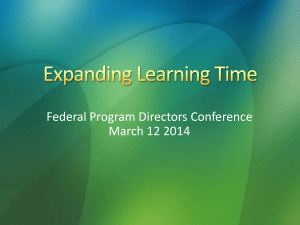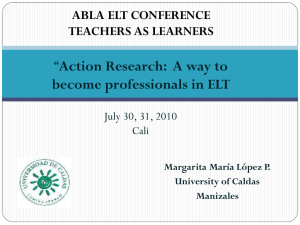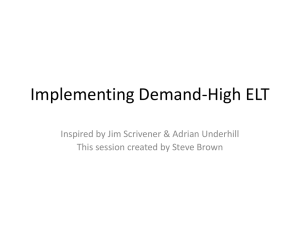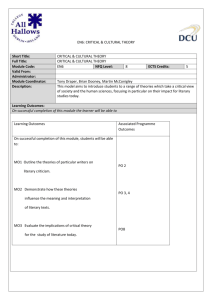2015 09Newsletter
advertisement
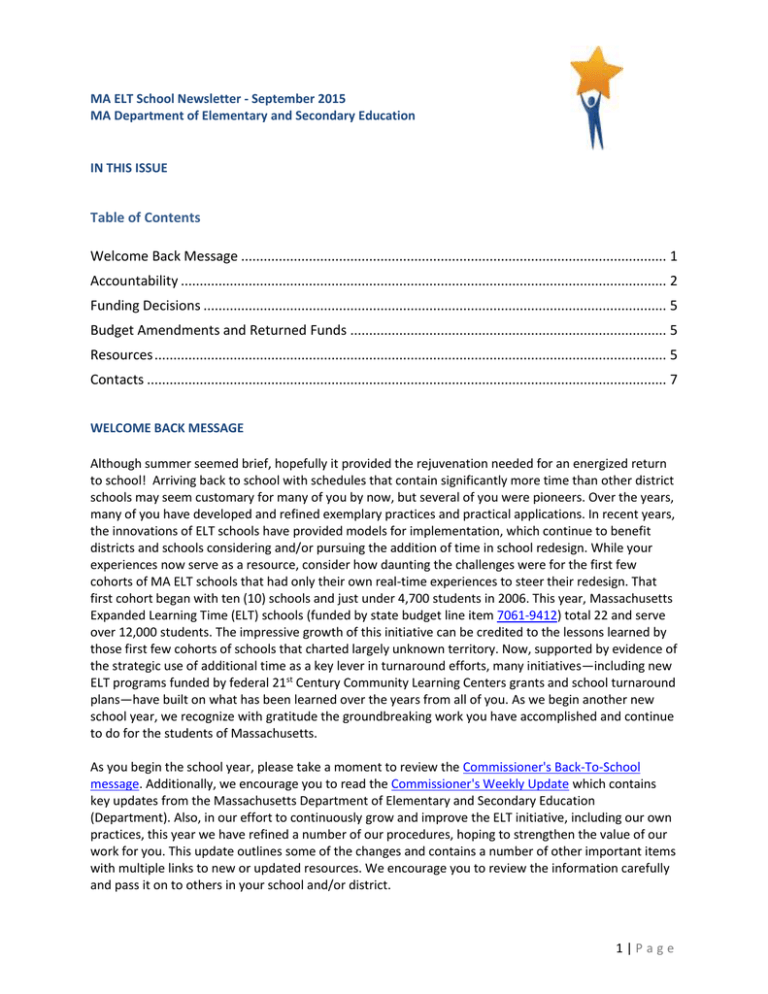
MA ELT School Newsletter - September 2015 MA Department of Elementary and Secondary Education IN THIS ISSUE Table of Contents Welcome Back Message ................................................................................................................. 1 Accountability ................................................................................................................................. 2 Funding Decisions ........................................................................................................................... 5 Budget Amendments and Returned Funds .................................................................................... 5 Resources ........................................................................................................................................ 5 Contacts .......................................................................................................................................... 7 WELCOME BACK MESSAGE Although summer seemed brief, hopefully it provided the rejuvenation needed for an energized return to school! Arriving back to school with schedules that contain significantly more time than other district schools may seem customary for many of you by now, but several of you were pioneers. Over the years, many of you have developed and refined exemplary practices and practical applications. In recent years, the innovations of ELT schools have provided models for implementation, which continue to benefit districts and schools considering and/or pursuing the addition of time in school redesign. While your experiences now serve as a resource, consider how daunting the challenges were for the first few cohorts of MA ELT schools that had only their own real-time experiences to steer their redesign. That first cohort began with ten (10) schools and just under 4,700 students in 2006. This year, Massachusetts Expanded Learning Time (ELT) schools (funded by state budget line item 7061-9412) total 22 and serve over 12,000 students. The impressive growth of this initiative can be credited to the lessons learned by those first few cohorts of schools that charted largely unknown territory. Now, supported by evidence of the strategic use of additional time as a key lever in turnaround efforts, many initiatives—including new ELT programs funded by federal 21st Century Community Learning Centers grants and school turnaround plans—have built on what has been learned over the years from all of you. As we begin another new school year, we recognize with gratitude the groundbreaking work you have accomplished and continue to do for the students of Massachusetts. As you begin the school year, please take a moment to review the Commissioner's Back-To-School message. Additionally, we encourage you to read the Commissioner's Weekly Update which contains key updates from the Massachusetts Department of Elementary and Secondary Education (Department). Also, in our effort to continuously grow and improve the ELT initiative, including our own practices, this year we have refined a number of our procedures, hoping to strengthen the value of our work for you. This update outlines some of the changes and contains a number of other important items with multiple links to new or updated resources. We encourage you to review the information carefully and pass it on to others in your school and/or district. 1|Page ACCOUNTABILITY ELT Site Visits As noted in a previous memo, this year we will move to a rating system in our site visit reports. Along with findings, we hope that ratings will help to communicate the quality of implementation more clearly. Rather than divide findings and evidence into areas of “Strengths” and “Areas for Improvement,” we will continue to develop findings in support of a rating for each Expectation for Implementation. The rating scale will allow us to convey more directly our assessment of performance on each Expectation. The scale is as follows: Rating Exemplary Meets Expectation Some Improvement Needed Major Improvement Needed Description The school fully and consistently meets the expectation and is a potential exemplar in this area. The school generally meets the expectation with no more than minor concern(s) noted. The school meets some aspects of the expectation but not others with no more than moderate concern(s) noted. The school falls far below the expectation and significant concern(s) are noted. Further, during full site visits, we will no longer deliver a full report-out on each of the eight (8) ELT Expectations for Implementation. Because accuracy is our primary goal, it is important that site visit teams have time to carefully and thoroughly review and corroborate the data collected during the visit before finalizing ratings for each expectation. In most cases, if there is sufficient evidence and team consensus reach during the visit, we will report-out findings on the following expectations: Expectation I – ELT design is driven by focused schoolwide priorities. Expectation VI – Additional time is used to enhance school culture. Expectation VII – School leadership is focused and collaborative. Ratings will appear in the written report only. We are preparing to conduct full ELT Site Visits for Cohort III and IV schools, which include: A.C. Whelan, Revere Arthur M. Longsjo, Fitchburg Carlton M. Viveiros, Fall River Garfield Middle School, Revere Huntington Elementary, Brockton McKinley/Hill School, Revere Site visits are one of the means by which the Department documents each ELT school’s performance and progress over time, corroborating and augmenting the information reported each year in the school’s reapplication within the context of the ELT Performance Agreement. Equally important, the visits enhance the Department’s understanding of ELT program strengths and challenges, and provide an opportunity to offer feedback to schools as well as inform statewide technical assistance. 2|Page Many of you have participated as peer reviewers on ELT site visit teams in the past and your insights as practitioners have been invaluable. If you, or members of your staff, are interested in participating as a peer reviewer on an ELT Site Visit team in this or future years (PDP points are available), please contact Moira Connolly for more information. Check-In Visits Please note that we also plan to conduct check-in visits to all Cohort I schools, as well as to the newer schools that came on board last year. These half-day check-in visits are designed to gather some observational and qualitative evidence regarding the schools’ implementation of expanded time and provide feedback, although on a more limited basis than that of full site visits. We will contact individual schools and districts about the scheduling of these visits in the coming weeks, hoping to start later in the fall. ELT Performance Agreements, Part I – Reminder of Changes - Cohort II All ELT schools receiving grant funding through Fund Code 225 will be drafting/redrafting ELT Performance Agreements either this year or in the coming years. All Cohort II schools will be submitting new three year performance agreements this year. Performance measured against these agreements will inform funding decisions and are one of the means by which the Department monitors each school’s implementation and outcomes. Due to the high demand across the state for limited ELT funds through line item 7061-9412, coupled with the ongoing emphasis on outcomes, expectations for schools currently receiving this funding are correspondingly high. As you know, ELT funds provided through state budget line item are intended to be used to effectively leverage time to improve student performance and it is not an entitlement, legacy, or turnaround grant. During the past few years, the Department has stopped grant funding to three (3) schools based on persistent concerns about each school’s ability to effectively leverage ELT funds to improve student performance. In an effort to maximize schools’ time to respond to concerns and better plan for the future, three-year performance agreements will be reviewed on an ongoing basis, and when necessary, the Department will require specific schools to meet targeted annual benchmarks in order to retain grant funding. The following changes to the ELT Performance Agreements, which were established last year with the new Cohort I performance agreements, will apply for all Cohort II schools and for all redrafting cohorts going forward: New ELT Performance Agreements will continue to be valid for three years, and will continue to be reviewed on an ongoing basis to ensure progress toward the goals outlined in these agreements. At the end of the third year of implementation of any ELT Performance Agreement, a determination will be made regarding future funding. If funding continuation is granted, the school will set new goals for the next three-year term. This funding determination will be made based on student performance data, qualitative evidence of high quality ELT implementation primarily gathered via site visits, and success in meeting ELT Performance Agreement measures. As in the past, continued funding during the performance agreement period is always subject to annual appropriations. If a school’s academic performance causes significant concern based on sustained performance below expectations or more precipitous short-term losses, we will inform the Commissioner, who may place a school on academic conditions that must be met in successive years in order to retain funding under the grant, regardless of the point in the three-year cycle of the school’s 3|Page performance agreement. Changes to ELT Performance Agreements, Part II In discussions with members of the field combined with our experience in providing technical assistance and monitoring, difficulty with developing multiple quantifiable or measurable goals for the Teacher Leadership and Collaboration and Enrichment sections of performance agreements has become a persistent issue. Further, these sections are more likely to need refinement and even wholesale revision prior to the end of the three-year term of the Performance Agreement, especially for schools new to ELT. In acknowledgment of these challenges, we will now require one goal, one objective, and one to two measures each for the Teacher Leadership and Collaboration and Enrichment sections of the performance agreement. While we encourage schools to continue to innovate and assess progress in these areas on multiple fronts, for three-year measurable goals, we anticipate that selecting fewer targets, but with more readily identifiable outcomes, will promote a higher degree of fidelity on which we can more confidently base funding decisions. Cohort II schools began implementing ELT in 2007-2008, and 2015-2016 concludes their current performance agreement period. The new, more focused development of performance agreements will begin with Cohort II schools. Schools Drafting New ELT Performance Agreements this Fall Include: Boston Arts Academy City View Discovery School Ferryway School Greenfield Middle School Newton School Silvia Elementary School Huntington McKinley/Hill For those schools scheduled to draft new performance agreements, the Department will conduct a webinar on the performance agreement format and creating outcome measures on Tuesday, October 6, 2015 at 3:30 p.m. Registration information will be sent in the coming weeks. Please see the following schedule of performance agreement draft submission and revision due dates: 1. Tuesday, October 6, 2015 – Technical Assistance Webinar for all ELT schools 2. Friday, October 30, 2015 – First draft of Performance Agreement due 3. Friday, December 18, 2015 – Final signed Performance Agreement due and submitted to the Department*. Throughout the drafting period, technical assistance and feedback will be provided by Moira Connolly. We also strongly encourage you to seek schoolwide collaboration in the development of all drafts of this document. *Please note: Grant funding will be placed on hold in districts whose school’s performance agreements are outstanding after the final draft due date until a satisfactory final draft is submitted and signed. 4|Page FUNDING DECISIONS Many of you participated in the Partnership for Assessment of Readiness for College and Careers (PARCC) in 2015. As you know, while MCAS results will be released in the next month or two, results from PARCC will not be released until November or December. The later schedule for release of PARCC student assessment data will cause certain funding decisions to be made later than in years past. For example, Cohort I schools that participated in PARCC and were placed on benchmarks last year when developing performance agreements will be notified of future funding for FY17 most likely in January, 2016 rather than in the fall of 2015. Should the Commissioner decide to discontinue funding, FY16 will be the last year of state funding for ELT will end. Please be sure that all district and school stakeholders are appropriately informed of the timing of this process. ESE staff plan to meet with some Cohort II district and school leaders this fall to provide preliminary feedback on continuation of ELT funding based on data, progress toward meeting performance agreement goals, and implementation evidence gathered at their spring, 2015 site visits. Schools making limited progress may be assigned interim benchmarks in their new ELT Performance Agreements that will be expected to be met the following year and successive years throughout the duration of the new performance agreement in order to be considered for continued annual funding, as well as a future three-year funding commitment (assuming sufficient annual appropriations). BUDGET AMENDMENTS AND RETURNED FUNDS In light of the funding reduction for FY16, it is imperative that all schools spend down the full amount of their ELT allocation by June 30, 2016 in order to demonstrate the need for, at minimum, level funding. Failure to expend all ELT funds allocated makes it difficult to advocate for funding in the future. Should you realize that you will not be spending down your entire allocation by or before June 30, 2016, you are expected to notify us as soon as possible, and no later than April 30, 2016. Should this arise, it is important that you develop a plan to spend down your grant funding in accordance with intended fund use and reapplication goals, whether by amending your budget and reallocating funds to another budget line, or by reallocating funds for summer activities with Department approval no later than April 30, 2016. Should the possibility of fund returns arise, please keep in mind that any returned funds by a district may negatively affect that district’s allocation for the next fiscal year, particularly if the line item is reduced. Funds cannot be carried over into the next fiscal year. Please note that, if you plan to utilize a portion of your grant allocation toward summer activities, an amendment must be done prior to April 30, 2016. If you need to amend your budget, please contact Moira Connolly immediately and she will send an amendment-ready workbook to you and guide you through the process. RESOURCES NCTL/Massachusetts 2020 Membership For those of you participating in the Massachusetts Expanded Learning Time Continuous Improvement Network organized and provided by NCTL/Massachusetts 2020, we are looking forward to seeing you at 5|Page the fall All Network Convening on Tuesday, October 27, 2015 at the Doubletree by Hilton (5400 Computer Drive, Westborough, MA). Should you have any questions with regard to membership or network participation, contact Shaunda Lewis, Program Manager, NCTL 617.378.3969 | slewis@timeandlearning.org Title 1 Guidance The U.S. Department of Education has issued guidance on how districts and schools can leverage their federal Title 1, Part A school-wide program funds. The guidance document highlights specific advantages and flexibilities available to school-wide programs and identifies common misunderstandings. Guidance can be found at: http://www2.ed.gov/policy/elsec/guid/eseatitleiswguidance.pdf High Quality Professional Development Case Studies The following link to ESE’s Curriculum and Instruction page brings you to a section on “High Quality Professional Development Case Studies from Across Massachusetts.” The page contains links to the PD plans of the four participating districts, videos, and power point presentations. In your own planning, it is often beneficial to see the quality delivery of PD in which other districts engage, and we hope that these case studies provide you with some helpful information on different approaches to professional development. Access the page at: http://www.doe.mass.edu/pd/CaseStudies/default.html. Wraparound Zone Replication “Cookbook” Many of you have proven that schoolwide wraparound strategies are remarkably powerful and effective, and it is exciting to see the successful approaches to wraparound at some of our ELT schools highlighted in the “Wraparound Replication Cookbook” that is now available! This user friendly handbook contains “recipes” for strong and effective wraparound practices. Access the PDF at: https://sites.google.com/site/masswazcookbook/home. Social-Emotional Learning (SEL) In keeping with the spirit of wraparound, our Office of Learning Supports and Early Learning (OLSEL) has issued a statement on social emotional-learning (SEL) in order to provide districts, schools, and programs with a better understanding of SEL and its various elements. As noted in this document: SEL includes the foundational skills, attitudes, and behaviors that help promote school engagement and academic success. There have been many frameworks developed by organizations such as the Collaborative for Academic, Social, and Emotional Learning (CASEL), to articulate the components of SEL. The common competencies identified are as follows: Self-awareness - identifying and understanding one’s own feelings Self-management - regulating and managing one’s own behavior, and setting and achieving goals Social awareness – empathizing with, and showing concern for others, and respecting diversity Relationship skills - establishing and maintaining positive relationships with others Responsible decision making - making constructive and positive choices The critical nature of social-emotional skills are supported by both research and evidence-based practice. Please be sure to access OLSEL’s entire statement at: http://www.doe.mass.edu/ssce/SEL.docx. Also, 6|Page teaching practices that promote SEL can be found in our Guidebook for Inclusive Practices (see below) at: http://www.doe.mass.edu/edeval/guidebook/sel.pdf. Webinar: Transition to High School This webinar is being presented by our Office of College and Career Readiness on October 13th from 3:00pm to 4:00pm and will focus on the transition to high school. The presentation will include information on why the grade 9 year is so important, data on the state of grade 9 students in Massachusetts, and district presentations on promising approaches. Register at: http://www.doe.mass.edu/conference/?ConferenceID=8170 From the Commissioner’s Update As mentioned earlier, the Commissioner’s Update contains news on a variety of educational topics impacting education in Massachusetts. The following information on inclusive practices and the 5-Step Educator Evaluation Cycle were highlighted in the August 21st edition: Guidebook For Inclusive Practice (see SEL above): The Department is pleased to announce the creation of the Educator Effectiveness Guidebook for Inclusive Practice. Created by Massachusetts educators, this optional resource includes tools to promote evidence-based best practices for inclusion following the principles of Universal Design for Learning (UDL), Positive Behavior Interventions and Supports (PBIS), and social and emotional learning (SEL). The tools are aligned to the Massachusetts Educator Evaluation Framework and support inclusive practice in the areas of goal setting; observations and feedback; artifact collection; student feedback; staff feedback; master scheduling; common assessments; and more. Guidebook Partners Opportunity: The Department is seeking to partner with educators at the classroom, school, and district levels to provide feedback on the usefulness and impact of the Guidebook's tools throughout the 2015-16 school year. Input from this group will inform revisions and updates to the Guidebook in the summer of 2016, and Guidebook partners will receive 36 hours of professional development credit from ESE. For more information, visit www.doe.mass.edu/edeval/guidebook or contact mholloway@doe.mass.edu. TEEM videos: Transforming educator evaluation in Massachusetts: In 2014-15, ESE partnered with Amherst-Pelham, Manchester Essex, Northbridge, and Revere to look at how those districts have reinforced the primary purpose of the evaluation process: professional growth that supports student learning. The resulting video series highlights aspects of the 5-Step Evaluation Cycle and innovative district systems that support effective evaluation. Districts and schools can use the TEEM Videos to: o See high-quality implementation in practice o Cultivate a shared understanding of the evaluation process o Generate new ideas for the continuous improvement of existing evaluation systems o Go online to watch "The Opportunity: Educator Evaluation in Massachusetts" or view the entire series. 7|Page Breakfast in the Classroom grant opportunity: The Eos Foundation is accepting applications for grants of up to $12,500 to start or expand Breakfast in the Classroom. Interested districts should submit their intent to apply by Sept. 30. For more weekly updates, go to: http://www.doe.mass.edu/commissioner/?update=9/4/2015. Feel free to share these updates with interested parties. CONTACTS As always, we welcome questions and feedback. For inquiries regarding MA ELT: Moira Connolly, Education Specialist for ELT: Kathy Cross, Resource and Capacity Specialist: Ruth Hersh, Assistant Director: Cliff Chuang, Associate Commissioner: 781-338-3216 mconnolly@doe.mass.edu 781-338-3231 kcross@doe.mass.edu 781-338-3211 rhersh@doe.mass.edu 781-328-3222 cchuang@doe.mass.edu 8|Page
